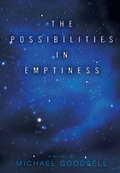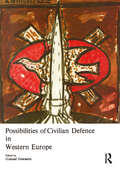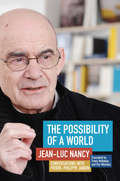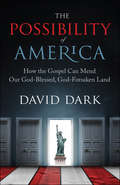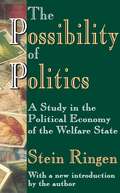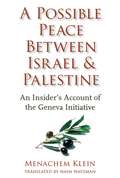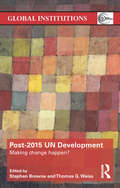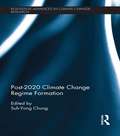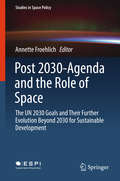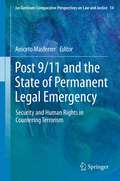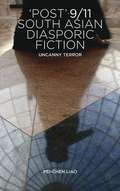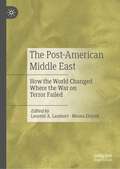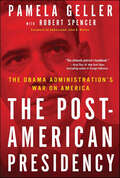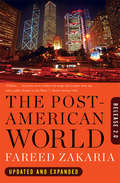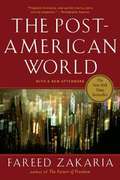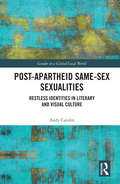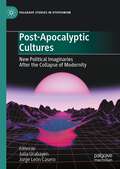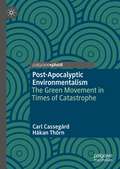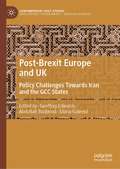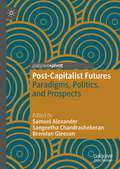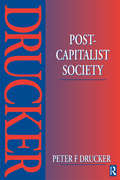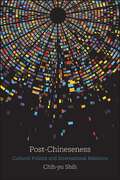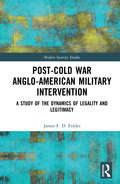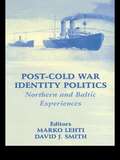- Table View
- List View
The Possibilities in Emptiness: A meditation on the mystery of existence in a universe reluctant to unfold itself
by Michael GoodsellA despairing protagonist on a quest for his inheritance. An alluring artist. Twin Japanese hostesses. A mad mathematician driving a kombi, and an old potter schooled in Zen, are part of the cast of characters in an adventure of the spirit; its hopes, dreams and desires. The Possibilities in Emptiness, is a book for all people. It takes you on a young man's battle against conscription and the Vietnam war, in 1970. And into the mysterious contradiction which is Japan, in the late 1980's. Miles Tracy is on a mission to find Shigeo Kitani...and anything to fill the void. If you like Bob Dylan, Che Guevara, Kurt Vonnegut, Zen, Sushi, and a search for meaning; then read on...
Possibilities of Civilian Defense in Western Europe
by Gustaaf GeeraertsThis is a collection of the 13 essays making up the proceedings of the 2nd international working conference on violence and non-violent action in industrialized Societies held in Brussels on the March 24-26th, 1976.
The Possibility of a World: Conversations with Pierre-Philippe Jandin
by Jean-Luc Nancy Pierre-Philippe Jandin Travis Holloway Flor MéchainIn this series of interviews, Jean-Luc Nancy reviews his life’s work. But like Schlegel’s historian—“a prophet facing backwards”—Nancy takes this opportunity to rummage through the history of art, philosophy, religion, and politics in search of new possibilities that remain to be thought. This journey through Nancy’s thought is interspersed with accounts of places and events and deeply personal details. The result is at once unpretentious and encyclopedic: Concepts are described with remarkable nuance and specificity, but in a language that comes close to that of everyday life. As Nancy surveys his work, he thinks anew about democracy, community, jouissance, love, Christianity, and the arts. In the end, this is a book about the possibility of a world—a world that must be greeted because it is, as Nancy says, already here.
The Possibility of America: How The Gospel Can Mend Our God-blessed, God-forsaken Land
by David DarkPublished in the years following 9/11, David Dark’s book The Gospel according to America warned American Christianity about the false worship that conflates love of country with love of God. It delved deeply into the political divide that had gripped the country and the cultural captivity into which so many American churches had fallen. <P><P> In our current political season, the problems Dark identified have blossomed. The assessment he brought to these problems and the creative resources for resisting them are now more important than ever. Into this new political landscape and expanding on the analysis of The Gospel according to America, Dark offers The Possibility of America: How the Gospel Can Mend Our God-Blessed, God-Forsaken Land. Dark expands his vision of a fractured yet redeemable American Christianity, bringing his signature mix of theological, cultural, and political analysis to white supremacy, evangelical surrender, and other problems of the Trump era.
The Possibility of Politics: A Study in the Political Economy of the Welfare State
by Stein RingenThe Possibility of Politics explores the power of political reform, specifically reform of the modern welfare state. Can reform be effective if limited to cautious and piecemeal interventions that avoid radicalism and revolution? Can it also avoid unwanted consequences? Will the welfare state survive in the future?Stein Ringen views the welfare state as a large-scale experiment in political reform. To ask if the welfare state works is to ask if political reform is possible at all. By its nature, the welfare state is reform on a grand scale, for it attempts to change the circumstances individuals and families live under without changing and disrupting society itself. But is it realistic to believe a population can get together, set goals and then try to meet these goals through collective actions, specifically public policies, without causing unintended consequences and destroying the state in the process? The welfare state attempts, idealistically, to redistribute welfare without reshaping the economic processes that cause inequities in the first place. Ringen considers how well redistribution has met the test in terms of political legitimacy, its intended effects on poverty and inequality, as well as its undesired and unintended effects on economic efficiency and the quality of private life. Ultimately, does the welfare state work? Further, is the welfare state a good thing?In considering these questions, The Possibility of Politics should be of particular value to academics and advanced students interested in political theory, public economics, social administration, and political sociology.Stein Ringen is professor of sociology and social policy at Oxford University and a Fellow of Green College. He teaches social and political theory and research methodology for graduates in social policy, sociology, politics, economic and social history and other subjects.
A Possible Peace Between Israel and Palestine: An Insider's Account of the Geneva Initiative
by Menachem KleinIn 2003, after two years of negotiations, a group of prominent Israelis and Palestinians signed a model peace treaty. The document, popularly called the Geneva Initiative, contained detailed provisions resolving all outstanding issues between Israel and the Palestinian people, including drawing a border between Israel and Palestine, dividing Jerusalem, and determining the status of the Palestinian refugees.The negotiators presented this citizens' initiative to the Israeli and Palestinian peoples and urged them to accept it. One of the Israeli negotiators was Menachem Klein, a political scientist who has written extensively about the Jerusalem issue in the context of peace negotiations. Although the Geneva Initiative was not endorsed by the governments of either side, it became a fundamental term of reference for solving the Middle East conflict. In this firsthand account, Klein explains how and why these groups were able to achieve agreement. He directly addresses the formation of the Israeli and Palestinian teams, how they managed their negotiations, and their communications with both governments. He also discusses the role of third-party facilitators and the strategy behind marketing the Geneva Initiative to the public.A scholar and participant in the Geneva negotiations, Klein is able to provide both an inside perspective and an impartial analysis of the diplomatic efforts behind this historic compromise. He compares the negotiations to previous Israeli-Palestinian talks both formal and informal and the resolution of conflicts in South Africa and Algeria. Klein hopes that by treating the event as a case study we can learn a tremendous amount about the needs and approaches of both parties and the necessary shape peace must take between them.
Post-2015 UN Development: Making Change Happen? (Global Institutions)
by Stephen Browne & Thomas G. WeissIn 2000, at the United Nations Millennium Summit, world leaders agreed to the Millennium Declaration. The Declaration included development targets to be reached by 2015, which were to become known as the Millennium Development Goals (MDGs). Progress has been made towards the achievement of the MDGs, but poverty remains widespread. With the terminal year approaching, the international community has begun the process of determining the goals which might follow the MDGs. While the UN is driving the process, there has been very little introspection on its own organizational capacity to help countries to meet the goals and is being increasingly sidelined by other more effective development organizations and initiatives. Based on extensive original research that has critically examined the role and functions of the organizations of the UN development system, this book seeks to capture in a single volume a comprehensive review of the UN’s performance and prospects for development. The contributors each offer extensive experience and familiarity—as practitioners and researchers—with the UN and development; and the book will contribute to the urgently needed debate on the reform of the UN development system at a critical juncture. The main rationale for this book, and its timing, is the unusual opportunity provided by the 2015 threshold to re-think the UN development system and to empower it to support a new development agenda and will be of interest to students, scholars of International Organizations and development studies.
Post-2020 Climate Change Regime Formation (Routledge Advances in Climate Change Research)
by Suh-Yong ChungThe fate of the climate change regime hangs in the balance as the UN-led negotiations try to forge a new international strategy for the post-2020 period. Since 1992, the UNFCCC and its Kyoto Protocol has been the primary legal instrument to respond to the climate challenge. However, the intergovernmental process has been riddled with problems that have rendered it ineffective. The changing economic landscape has further made this country grouping problematic as some developing countries now emit more than some of their advanced counterparts. Such problems have crippled the existing regime in adequately addressing climate change. Building upon the expertise of the contributors of this volume, this ground-breaking collection aims to show the way forward for the intergovernmental process. It is the first of its kind to explore the key features of the regime, featuring meticulously researched pieces from leading experts in the field. Each chapter responds to the questions surrounding the political and structural limitations of the current top-down approach taken in climate negotiations and proposes various alternatives countries can take to overcome such limitations in the process of building the post-2020 climate change regime. In particular, this collection underscores the concept of low-carbon development and green growth to make the climate change regime more effective.
Post 2030-Agenda and the Role of Space: The UN 2030 Goals and Their Further Evolution Beyond 2030 for Sustainable Development (Studies in Space Policy #17)
by Annette FroehlichThis book provides a deep insight to which extent further improvement should be envisaged to ensure and improve the sustainable development beyond 2030 (the Sustainable Development Goals is a set of 17 global goals with 169 associated targets which the state community adopted in 2015). As the world, its environment, economy and society is getting more and more technical advanced, it is of high interest to analyze how space and its various applications can support this development. Once the Goals of the “2030 Agenda for Sustainable Development” will be achieved new challenges are waiting. The analysis takes into account a proactive use of artificial intelligence for the development based on space infrastructure. Another important aspect revolves around the economic development which asks for further analysis of the cryptocurrencies relationship with space applications and how to use space based cryptocurrencies for development. Environment-wise the challenges for a sustainable development on Earth i.e. water supply, but also in outer space are requested ensuring a sustainable exploration and exploitation of space and its orbital resources. The book also highlights possible contributions of the post-2030 space industry to global economic development based on satellite technology and the enlargement of the scope of application of satellite data in administration and Justice to ensure development of effective, accountable and transparent institutions at all levels to promote growth, stability and security and peace on global level.
Post 9/11 and the State of Permanent Legal Emergency
by Aniceto MasferrerThe terrorist attacks occurred in the United States on 11 September 2001 have profoundly altered and reshaped the priorities of criminal justice systems around the world. Atrocities like the 9/11 attacks, the Madrid train bombings of March 2003, and the terrorist act to the United Kingdom of July 2005 threatened the life of democratic nations. The volume explores the response of democratic nation-states to the problems of terrorism and counter-terrorism within the framework of the Rule of Law. One of the primary subjects of study is the ways in which the interests of the state (security from external threats, the maintenance of civil peace, and the promotion of the commonwealth) are balanced or not with the liberty and freedom of the citizens of the state. The distinctive aspect of this focus is that it brings a historical, political, philosophical and comparative approach to the contemporary shape and purposes of the criminal justice systems around the world.
‘Post’-9/11 South Asian Diasporic Fiction: Uncanny Terror
by Pei-Chen LiaoWhile much of the critical discussion about the emerging genre of 9/11 fiction has centred on the trauma of 9/11 and on novels by EuroAmerican writers, this book draws attention to the diversity of what might be meant by "post" -9/11 by exploring the themes of uncanny terror through a close reading of four "post" -9/11 South Asian diasporic fictions.
The Post-American Middle East: How the World Changed Where the War on Terror Failed
by Laurent A. Lambert Moosa ElayahAfter two decades of War on Terror, it is particularly important, for both academic and policy purposes, to clearly understand why the US formidable mobilization of means and might has transformed into a such a blatant geostrategic defeat of the US and its allies in the broad Middle East. This is all the more paradoxical that the WOT achieved a series of tactical victories – such as the toppling of hostile regimes in Afghanistan, Iraq and Libya; the crippling of the national economies of enemy states by sanctions; the successful targeted killing of lead terrorist Usama Bin Laden, ISIS cult leaders Abu Bakr Al-Baghdadi and his successor, etc. So, why have these tactical victories not led to what was supposed to become, according to the US government, a ‘Greater Middle East’? With most authors being from or living in the Middle East, this book is unique as it brings perspectives and answers from the region. This is crucially important as we are entering, we argue, the era of a Post-American Middle East.Chapters 1 and 10 are available open access under a Creative Commons Attribution 4.0 International License via link.springer.com
The Post-American Presidency: The Obama Administration's War on America
by Pamela Geller Robert SpencerPopular conservative blogger Pamela Geller and New York Times bestselling author Robert Spencer sound a wake-up call for Americans to stop the Obama administration from limiting our hard-won freedoms, silencing our democratic voices, and irreparably harming America for generations to come. America is being tested in a way that she has never been tested before. Since taking the oath of office in January 2009, President Barack Obama has cheered our enemies and demoralized our allies. He is hard at work "remaking" America by destroying the free-market system and nationalizing major segments of our economy, demonizing dissent and restricting freedom of speech, turning against our longtime friends, and above all, subjecting us to the determinations of foreign authorities. In this timely and urgent battle cry, Pamela Geller, founder of the widely popular website www.AtlasShrugs.com, and New York Times bestselling author Robert Spencer team up to expose the Obama administration’s destructive agenda—largely ignored by the mainstream media—and rally Americans to protect the sovereignty of a country that is under siege by the highest levels of its own government. As Americans see their paychecks shrinking every day, Obama ignores our forefathers’ founding principle: individual rights. Instead, he seeks to level the playing field—to transform both the global and national landscape in favor of our enemies—even if it means cutting America off at the knees. He envisions himself as more than just a president of the United States, but as a shaper of the new world order, an internationalist energetically laying the groundwork for global government: the president of the world. A vital guide to helping conservatives prepare for the tough battles ahead, The Post-American Presidency critically examines the Obama administration’s ominous and revealing moves against our basic freedoms, particularly as he seizes control of the three engines of the American economy: health care, energy, and education. The Shining City on a Hill has gone dark. But America is not dead. The time is NOW to stand up and fight.
The Post-American World: Release 2.0 (International Edition)
by Fareed Zakaria"A relentlessly intelligent book." --Joseph Joffe, New York Times Book Review "This is not a book about the decline of America, but rather about the rise of everyone else." So begins Fareed Zakaria's blockbuster on the United States in the twenty-first century, and the trends he identifies have proceeded faster than anyone anticipated. How might the nation continue to thrive in a truly global era? In this fully updated 2.0 edition, Zakaria answers these questions with his customary lucidity, insight, and imagination.
The Post-American World
by Fareed ZakariaZakaria (Time magazine editor-at-large and host of CNN's "Fareed Zakaria GPS") updates his discussion of the relative decline of American global power in order to take into account the impact of the economic crisis of the late 2000s and other recent developments, which have only accelerated the transition to the "post-American" world and the rise of new powers in Zakaria's estimation. It must be stressed that Zakaria is only predicting a relative decline in power for the United States and that he believes that the United States can maintain a healthy position in the world by more carefully balancing foreign policy priorities, pushing for broad international rules conducive to long-term US interests instead of pushing for narrow and short-term interests, seeking better relations with rising powers instead of seeking to balance against them, encouraging ad hoc multilateral approaches to global problems in lieu of the lost hegemonic order, recognizing the dangers of opponents' asymmetric power in order to avoid getting sucked into traps, and recognizing international legitimacy as a key element of national power.
Post-Apartheid Same-Sex Sexualities: Restless Identities in Literary and Visual Culture (Gender in a Global/Local World)
by Andy CarolinThis book examines how same-sex sexualities are represented in several post-apartheid South African cultural texts, drawing on a rich local archive of same-sex sexualities that includes recent fiction, drama, film, photography, and popular print culture. While the book situates these texts within the specific context of post-apartheid South Africa, it also looks outwards towards transnational connectivity and cultural flows. The author uses the idea of restlessness to refer to the uneven flow of cultural tropes, political sentiment, ideas, ideologies, and representational modes across geographical boundaries, across time and space, and between genres, presenting sexual cultures as simultaneously rooted and transnational. He focuses on how notions of race and gender, in the shadow of colonialism and apartheid, play out in the present and shape how sexualities are represented. This interdisciplinary book offers a conceptual entry point to several areas of study, including transnationalism, literary and cultural studies, critical race theory, gender and sexuality studies, and African studies, and will be of interest to students and researchers across these fields. Its inclusion of a range of textual genres extends its reach into visual culture, film and media studies, history, and politics.
Post-Apocalyptic Cultures: New Political Imaginaries After the Collapse of Modernity (Palgrave Studies in Utopianism)
by Julia Urabayen Jorge León CaseroThis book advocates for the necessity of recovering the value of utopias as political projects that open new channels of action. The criticism of modern political utopias is based on the supposed impossibility of creating for the future because there is no longer a future (apocalyptic ideology). However, this edited collection seeks to show that the post-apocalyptic world in which we live entails a renewed freedom of design for the radical reorganization of institutions. Post-apocalyptic cultures are not obligated to follow the capitalist, anthropocentric, correlationist and sovereign modes of the old political project of emancipation—the Western enlightenment—that has started to collapse. With this in mind, this book is divided into four sections dedicated to the main themes from which to rethink the projects of political emancipation that are possible nowadays: technopolitics; posthumanist biopolitics; non-western politicsl and the crossover between arts and politics.
Post-Apocalyptic Environmentalism: The Green Movement in Times of Catastrophe
by Carl Cassegård Håkan ThörnThis book analyses how the environmental movement has developed three overarching narratives that co-exist and compete within it. The first is the narrative of green progress, which has been prominent from the start in environmentalist thought and which is today expressed in the idea of sustainable development and in eco-modernism. The second is the apocalyptic narrative, which urges us to act in order to avert a future catastrophe and which rose to prominence with Rachel Carson and other classics of post-war environmentalism and experienced a renaissance with the climate activism of the 2000s. The third is the postapocalyptic narrative according to which catastrophe is already an unavoidable fact. The centrepiece of the book is its discussion of the postapocalyptic narrative, which has become influential in the recent decade, especially in the wake of the disillusionment following the failed climate summit in Copenhagen 2009. Climate change, resource exhaustion, pollution and species extinction signal that catastrophes have already become realities here and now for an enormous number of people and other lifeforms. The book probes the possibilities and limitations of the environmental movement in grappling with these issues and turning them into relevant action.
Post-Brexit Europe and UK: Policy Challenges Towards Iran and the GCC States (Contemporary Gulf Studies)
by Geoffrey Edwards Abdullah Baabood Diana GaleevaThis book discusses how tensions and unknowns may impact future relations between a post-Brexit UK, the EU and the countries of the Gulf, including Iran. The authors of this book consider, in different ways, whether British and EU27 relations with the Gulf States may change or whether the traditions and the weight of their history reinforce the pre-existing patterns of these relationships. Ongoing changes in the Gulf, the present disputes and the trajectories economic reform also influence these discussions. The book analyses the changing positions of the US, China and Russia that are likely to impact Europe’s interests. It explores outcomes of ongoing world challenges, such as the COVID-19 pandemic and the crash of oil prices, to further examine Post-Brexit Europe and UK policy challenges towards Iran and the GCC States.
Post-Capitalist Futures: Paradigms, Politics, and Prospects (Alternatives and Futures: Cultures, Practices, Activism and Utopias)
by Samuel Alexander Sangeetha Chandrashekeran Brendan GleesonAs the crises of capitalism continue to intensify, radical thinkers must conjure realistic and inspirational alternative futures beyond this failing social order. This book presents a stimulating array of essays exploring such post-capitalist futures. With contributions and perspectives from the Global North and Global South, central topics include ecosocialism, ecofeminism, degrowth, community economies, and the Green New Deal. There are also chapters offering analyses of land, energy, technology, universal basic services, and (re)localisation of economies. The book is in three parts. The first presents various alternative paradigms for thinking about – and working toward – post-capitalist futures. The second section offers perspectives on alternative governance strategies and approaches for post-capitalist futures. The closing section gathers various analyses of post-capitalist geographies and resistance. Going beyond critique and instead envisioning alternative imaginaries, this collection should challenge and inspire readers to think and act upon the range of possibilities immanent in our crisis-ridden present.
Post-Capitalist Society
by Peter DruckerWe are in the middle of another time of radical economic change, from the Age of Capitalism and the Nation-State, to a Knowledge Society.
Post-Capitalist Society
by Peter Drucker"The basic economic resource - 'the means of production', to use the economist's term - is no longer capital, nor natural resources, nor 'labour'. it is an will be knowledge."With penetrating insight Peter Drucker describes the changes that are affecting politics, business and society itself. It is vital that we are aware of and understand these changes in order to benefit from the opportunities that the future has to offer.
Post-Chineseness: Cultural Politics and International Relations (SUNY series, James N. Rosenau series in Global Politics)
by Chih-yu ShihThere have been few efforts to overcome the binary of China versus the West. The recent global political environment, with a deepening confrontation between China and the West, strengthens this binary image. Post-Chineseness boldly challenges the essentialized notion of Chineseness in existing scholarship through the revelation of the multiplicity and complexity of the uses of Chineseness by strategically conceived insiders, outsiders, and those in-between. Combining the fields of international relations, cultural politics, and intellectual history, Chih-yu Shih investigates how the global audience perceives (and essentializes) Chineseness. Shih engages with major Chinese international relations theories, investigates the works of sinologists in Hong Kong, Singapore, Pakistan, Taiwan, Vietnam, and other academics in East Asia, and explores individual scholars' life stories and academic careers to delineate how Chineseness is constantly negotiated and reproduced. Shih's theory of the "balance of relationships" expands the concept of Chineseness and effectively challenges existing theories of realism, liberalism, and conventional constructivism in international relations. The highly original delineation of multiple layers and diverse dimensions of "Chineseness" opens an intellectual channel between the social sciences and humanities in China studies.
Post-Cold War Anglo-American Military Intervention: A Study of the Dynamics of Legality and Legitimacy (Modern Security Studies)
by James F. FiddesExploring case studies from the first Gulf War to the Syria crisis, this book discusses different approaches to the use of international law and the role it plays in international power politics. Analysis of the post-Cold War overseas military involvements of Western powers has focused on their legality and legitimacy, allowing for a conflation of the concepts and distracting from the true source of international legitimacy. Demonstrating compliance with international law can be helpful, but it plays a secondary role to other, more powerful considerations such as national interest and shared national security concerns. Exploring the key drivers for decision-makers, this book identifies the impact of previous experience on the use of international law in the quest for legitimacy ahead of launching military action. Patterns in approach and of relations between close Western allies (in particular the UK and US) are identified, offering valuable lessons for future strategic decision-making. This book will appeal to scholars and students of International Relations and International Law. Think Tanks focussing on International Relations and the use of force and practitioners working in the realm of foreign policy with a focus on the UN and international law will also be interested in the study and conclusions drawn.
Post-Cold War Identity Politics: Northern and Baltic Experiences (Routledge Studies in Nationalism and Ethnicity)
by David J. Smith Marko LehtiDuring the past decade northern Europe has started to assume an identity of its own. Categories of East and West have become blurred, challenging as well the idea of what it means to be Nordic. Post-Cold War Identity Politics maps this process in Scandinavia. Looking at projects designed to help regional development in the Nordic countires, it assesses whether a new way of defining 'Northern-ness' is emerging. The book highlights the existence of co-existing and - to some extent - competing region-building projects in northern Europe. It demonstrates how they are all efforts by existing nations to redefine their role in Europe at a time of change, and points to how they might develop in the future.
